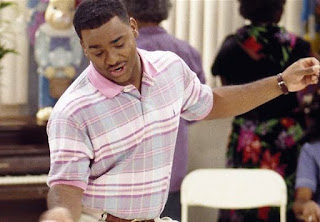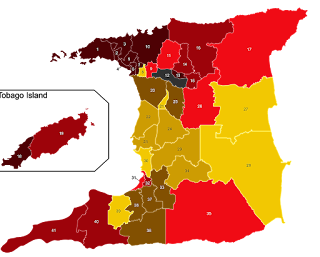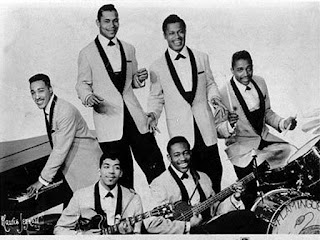After our very last post, more on dance steps! Former "Fresh Prince of Bel-Air" star Alfonso Ribeiro has been involved in a lawsuit with Take-Two Interactive, publisher of the video game "NBA 2K," and the publisher of "Fortnite" over avatars in the games being able to do the dance that his character popularised on the hugely popular '90s sitcom ' the 'Carlton Dance'. But now that action has taken a knock back as details of a letter from Saskia Florence at the US Copyright Office to Ribeiro's attorney, David Hecht surfaced as part of federal court documents in California. In the correspondence, Florence wrote that the moves are "a simple dance routine." adding "as such, it is not registrable as a choreographic work".
 The EU Commission has removed a rather odd blog post that attacked internet campaigners, admitting its language was not appropriate and that it could be interpreted as offensive. The post was positioned as a response to the various battles around the EU's planned copyright directive, which introduces a series of reforms, and pointed to the aggressive and polarising lobbying from the tech sector. The post was titled ‘The Copyright Directive: How the mob was told to save the dragon and slay the knight’ and the controversial text included the opinion (that seems related to Brexit) that “We know from recent elections and referendums that simple memorable slogans – however untrue or unobtainable – can go a long way to winning over hearts, minds and voters. Never let the truth get in the way of a catchy slogan”. The post went further in its criticism of the tech sectors efforts to mislead the public by employing dubious campaigning tactics saying “It appears as if the largest search and video platforms in the world are afraid of regulation – despite having overwhelming dominance on the internet. Furthermore, there is ample evidence that ‘big technology’ has even ‘created’ grassroots campaigns against the copyright directive in order to make it look and sound as if the EU is acting against the ‘will of the people'”. A statement in place of the post now reads: “This article published by the Commission services was intended to reply to concerns, but also to misinterpretations that often surround the copyright directive proposal. We acknowledge that its language and title were not appropriate and we apologise for the fact that it has been seen as offending”. In related news, representatives of European Union governments have endorsed the compromise reached with the EU Parliament on the overhaul of the bloc's copyright rules, the Romanian presidency of the EU said in a statement on Twitter.
The EU Commission has removed a rather odd blog post that attacked internet campaigners, admitting its language was not appropriate and that it could be interpreted as offensive. The post was positioned as a response to the various battles around the EU's planned copyright directive, which introduces a series of reforms, and pointed to the aggressive and polarising lobbying from the tech sector. The post was titled ‘The Copyright Directive: How the mob was told to save the dragon and slay the knight’ and the controversial text included the opinion (that seems related to Brexit) that “We know from recent elections and referendums that simple memorable slogans – however untrue or unobtainable – can go a long way to winning over hearts, minds and voters. Never let the truth get in the way of a catchy slogan”. The post went further in its criticism of the tech sectors efforts to mislead the public by employing dubious campaigning tactics saying “It appears as if the largest search and video platforms in the world are afraid of regulation – despite having overwhelming dominance on the internet. Furthermore, there is ample evidence that ‘big technology’ has even ‘created’ grassroots campaigns against the copyright directive in order to make it look and sound as if the EU is acting against the ‘will of the people'”. A statement in place of the post now reads: “This article published by the Commission services was intended to reply to concerns, but also to misinterpretations that often surround the copyright directive proposal. We acknowledge that its language and title were not appropriate and we apologise for the fact that it has been seen as offending”. In related news, representatives of European Union governments have endorsed the compromise reached with the EU Parliament on the overhaul of the bloc's copyright rules, the Romanian presidency of the EU said in a statement on Twitter.
And with that final draft of the European Copyright Directive now being considered, a number of organisations representing independent record labels and music publishers, songwriters and their collecting societies published a letter calling on the EU Council and European Parliament to vote through the copyright reforms. Independent label's group IMPALA and the Independent Music Publishers International Forum led the call for support for the Directive to now be adopted along with support from the European Composer And Songwriter Alliance, and collecting society groups CISAC and GESAC, with the letter saying "We, the undersigned organisations, representing authors, composers, writers, journalists, photographers and others working in all artistic fields, news agencies, book, press and music publishers, audiovisual and independent music producers, call on the Council Of The European Union and the European Parliament to adopt the Directive On Copyright In The Digital Single Market".
 Perhaps in preparation for EU reforms,YouTube has announced changes to it's 'strikes' system as it applies to content flagged for violating the company’s Community Guidelines. Starting February 25th, the first time a creator’s content is flagged, they will get a one-time warning and their flagged content will be removed. Prior to this change, there was no warning, and a first strike would result in a 90-day freeze on live streaming. A second strike would result in a two-week freeze on video uploads. A YouTube spokesperson told Gizmodo that the strike policies for Community Guidelines and copyright are entirely separate, and that YouTube employees don’t get directly involved copyright disputes. The spokesperson said that if YouTube receives a DMCA takedown notice, they must legally comply with that request and remove the content. Community Guidelines violations—like harmful, hateful, violent content, and spam—are reviewed and decided upon by members of the YouTube team, according to the spokesperson.
Perhaps in preparation for EU reforms,YouTube has announced changes to it's 'strikes' system as it applies to content flagged for violating the company’s Community Guidelines. Starting February 25th, the first time a creator’s content is flagged, they will get a one-time warning and their flagged content will be removed. Prior to this change, there was no warning, and a first strike would result in a 90-day freeze on live streaming. A second strike would result in a two-week freeze on video uploads. A YouTube spokesperson told Gizmodo that the strike policies for Community Guidelines and copyright are entirely separate, and that YouTube employees don’t get directly involved copyright disputes. The spokesperson said that if YouTube receives a DMCA takedown notice, they must legally comply with that request and remove the content. Community Guidelines violations—like harmful, hateful, violent content, and spam—are reviewed and decided upon by members of the YouTube team, according to the spokesperson.
The Copyright Royalty Board in the US has published the new mechanical royalty rates that will apply for the use of music in America. The new rates were first published a year ago and include a top line 44% increase in the revenue share rate being paid by the streaming services, which will rise from 10.5% to 15.1%. After a further period of consultation with submissions from both music owners and music users a ‘final determination’ has now followed - although participating parties still have one more chance to appeal. Benjamin Semel who represents the National Music Publishers Association commented: “The final determination that became effective today is even stronger than the initial determination, as the judges clarified an important definition during the rehearing motion phase, providing additional protection against streaming services using product bundling to exclude revenues from the royalty pool”. NMPA President & CEO David Israelite said that digital music companies would ‘declare war on songwriters’ should they appeal the 44% streaming royalty rise decided by the Copyright Royalty Board adding “Apple has announced it will not appeal. The others won’t say. We will know soon whether some digital companies want to be partners or want to attack the songwriters who make their businesses possible. Stay Tuned.”
US Radio lobbyists and a bipartisan coalition of lawmakers in Washington DC are backing the Local Radio Freedom Act, which would limit the royalties radio stations have to pay for the use of recordings. Similar bills failed in 2017 and 2015 and of course the rapidly passed Music Modernization Act did much to update the law on music use in the USA. Now 124 congress members and five senators have signed on as initial co-sponsors. The bills argue that radio stations "provide free publicity and promotion to the recording industry and performers," so they should not be obliged to pay "any new performance fee, tax, royalty, or other charge." If such fees were imposed, the bill's proponents argue, it would cause "severe economic hardship." Or perhaps just reduce profits for broadcasters.
And finally, in Trinidad & Tobago, Police have arrested seven people in Port of Spain for copyright infringement..The seven vendors were targeted during an exercise which saw officers of the Port of Spain Division, the Municipal Police, and officials from Awesome Copyright interview CD vendors in Independence Square and Charlotte Street. Various CDs and sound equipment were seized with the arrests made pursuant tof Section 41 of the Trinidad and Tobago Copyright Act. The offence carries a jail term of up to ten years and/or a fine of up to $250,000.




















